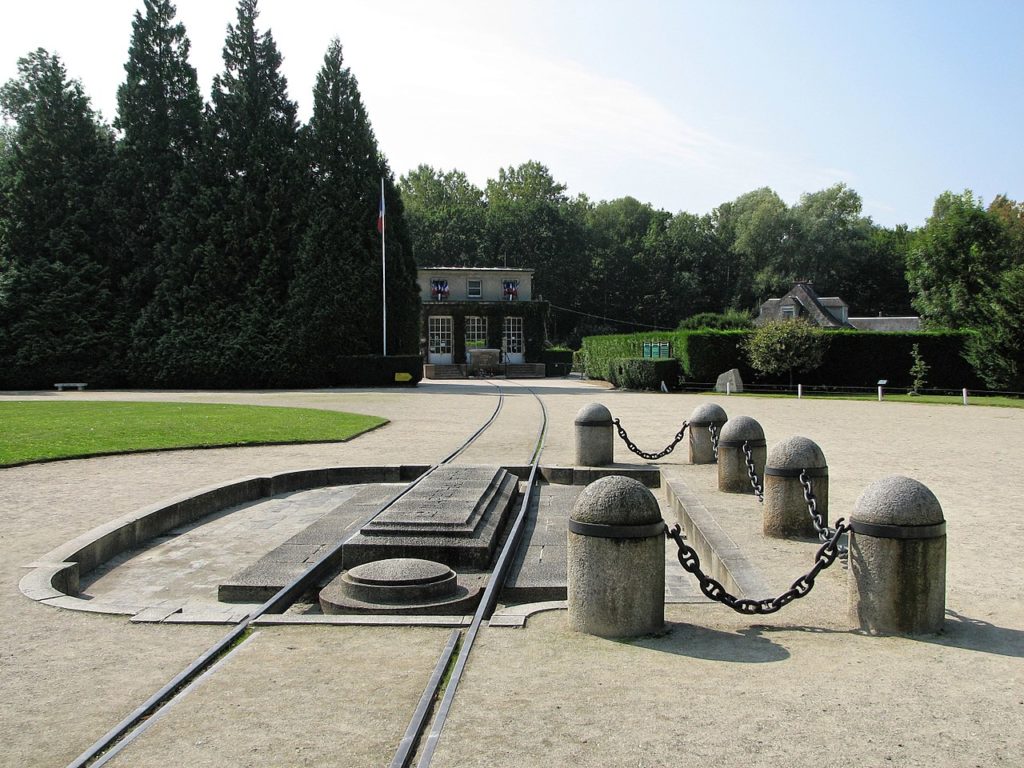Dieser Artikel ist auch auf deutsch erschienen.
Merkel and Macron embracing each other on the 100th commemoration of the ceasefire agreement for the First World War was a world-wide phenomenon. Such moments give pause for thought. Just one hundred years ago, France and Germany were locked in a historical rivalry that made it seemingly impossible for these peoples to reconcile and stop further bloodshed on the continent. This rivalry culminated in the “great seminal catastrophe” of the 20th century, in which the massive amounts of death and peril reached hitherto unknown heights. New technologies such as automatic weapons, improved artillery and chemical warfare were in part to blame for that.

Monument of the Compiègne Wagon, the place where the armistice of Germany was signed, marking the end of WWI (CC-BY-SA MagentaGreen via Wikimedia)
Even though there is relative peace on the European continent now, states worldwide have not stopped to further the tradition of coming up with methods and instruments of warfare. But what many people often forget is that the greatest dangers don’t lie in the designs of new jets or international weapon trades, but in our very own palms most of the day. The internet is not just a tool to connect us to each other through social networks, but also provides the infrastructure for many basic services in modern states. From communication networks between companies, through medical logistics all the way to electrical grids; many things are now based on the internet. An attack on this infrastructure would, as experts claim, essentially cripple a nation and lead to new potential in warfare.
Because of this danger that might arise with new technological feats, leaders of multiple countries and companies in the tech-sector met in Paris after the commemoration ceremony of the centenary of the World War 1 ceasefire at the “Digital Week”. The event provided a platform to exchange ideas and proposals between tech-giants and world leaders and culminated in the initiative led by Macron by the name of “Paris Call for Trust and Security in Cyberspace”. The declaration addresses issues of global cyber-criminality and threats in the virtual space. More specifically, country leaders and large tech companies have professed to protect the functionality of the internet and improve its usability and accessibility. Further topics of the treaty concern protection of intellectual property, actions against election meddling and curbing the influence of dangerous non-state actors on the internet. It is thus not surprising that states like Russian, the United States of America, Saudi Arabia, Israel, Iran and China were not among the signatories of this treaty. On the other hand, all EU member states were among the signatories in this show of solidarity against odds. Next to the EU members, another 23 states and a wide array of international companies (e.g. Siemens, Airbus, Nokia and Microsoft) as well as multiple tech-related institutions worldwide were members of this pact.
Much changed in the past one hundred years. Instead of a fractured and warring Europe, we are experiencing an era of peace, cooperation and prosperity. The fact that instead of attacking each other’s fronts we are now standing united on new frontiers, shows the true progress we have made in the last century.
By Stefan Schwarz
Further Reading
- Lin Yang Kang – The Threat, Defense, and Control of Cyber Warfare
- France Diplomatie – Die Paris Digital Week bietet die Möglichkeit zur Begründung einer vielfältigen Partnerschaft
- Joe Uchill – More than 50 nations, but not U.S., sign onto cybersecurity pact
- Louise Matsakis – The US Sits out an International Cybersecurity Agreement
Image Sources
- Monument of the Compiègne Wagon, the place where the armistice of Germany was signed, marking the end of WWI (CC-BY-SA MagentaGreen via Wikimedia)

